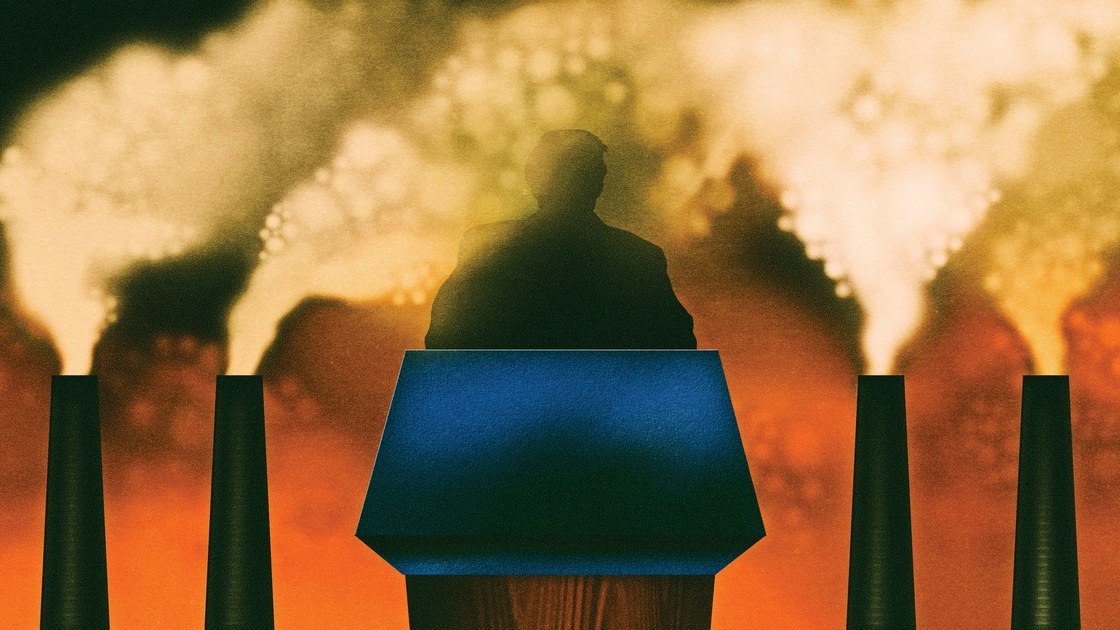The 1968 Book That Tried to Predict the World of 2018 | The New Yorker

If you wanted to hear the future in late May, 1968, you might have gone to Abbey Road to hear the Beatles record a new song of John Lennon’s—something called “Revolution.” Or you could have gone to the decidedly less fab midtown Hilton in Manhattan, where a thousand “leaders and future leaders,” ranging from the economist John Kenneth Galbraith to the peace activist Arthur Waskow, were invited to a conference by the Foreign Policy Association. For its fiftieth anniversary, the F.P.A. scheduled a three-day gathering of experts, asking them to gaze fifty years ahead. An accompanying book shared the conference’s far-off title: “Toward the Year 2018.”
The timing was not auspicious. In America, cities were still cleaning up from riots after Martin Luther King, Jr.,’s assassination, in April, and protests were brewing for that summer’s Democratic National Convention. But perhaps the future was the only place left to escape from the present: more than eight hundred attendees arrived at the Hilton. “They met in the grand ballroom,” the reporter Edwin Yoder wrote at the time, “which is not so much futuristic as like a dimly remembered version of the 1920s small-town grand movie house.”
Invitees were carefully split by the F.P.A. between over-thirty-fives and under-thirty-fives—but, less carefully, they didn’t pick any principal speakers from the under-thirty-fives. As their elders mused on a future of plastics and plasma jets, without mention of Vietnam and violence in the streets, there was muttering among the younger attendees. Representatives from Students for a Democratic Society demanded time at the mike and circulated a letter questioning whether the conference was for “discussion or brain washing.” Waskow, today the rabbi of the Shalom Center in Philadelphia, was an S.D.S. alumnus attending the conference out of a sincere interest in the future—but he was skeptical of futurism. By 1968, he’d already been working for more than a decade on a never-finished epistolary sci-fi novel, “Notes from 1999.” “But,” Waskow explains, “I was interested in changing the world—not trying to predict the future, but to create the future.”
Activists weren’t the only ones scrutinizing the event. F.B.I. informants were tracking S.D.S. attendees—but only because they were already investigating the starchy Foreign Policy Association for Communism. Hearing now of informants lurking amid the hotel-lobby ferns, Michael Zweig, of SUNY Stony Brook—a conference invitee and a founding S.D.S. member—regards the Bureau’s paranoia with some incredulity. “I mean, everybody was a Communist, right?” he says wryly. If participants on either side emerged from the Hilton ballroom confident of what 2018 would look like, they soon found themselves disabused about predicting 1968. A week later, Bobby Kennedy was shot dead, and the prospect of grasping the present, let alone the future, seemed further away than ever. And that was about when “Toward the Year 2018” arrived in bookstores.
“MORE AMAZING THAN SCIENCE FICTION,” proclaims the cover, with jacket copy envisioning how “on a summer day in the year 2018, the three-dimensional television screen in your living room” flashes news of “anti-gravity belts,” “a man-made hurricane, launched at an enemy fleet, [that] devastates a neutral country,” and a “citizen’s pocket computer” that averts an air crash. “Will our children in 2018 still be wrestling,” it asks, “with racial problems, economic depressions, other Vietnams?”
Much of “Toward the Year 2018” might as well be science fiction today. With fourteen contributors, ranging from the weapons theorist Herman Kahn to the I.B.M. automation director Charles DeCarlo, penning essays on everything from “Space” to “Behavioral Technologies,” it’s not hard to find wild misses. The Stanford wonk Charles Scarlott predicts, exactly incorrectly, that nuclear breeder reactors will move to the fore of U.S. energy production while natural gas fades. (He concedes that natural gas might make a comeback—through atom-bomb-powered fracking.) The M.I.T. professor Ithiel de Sola Pool foresees an era of outright control of economies by nations—“They will select their levels of employment, of industrialization, of increase in GNP”—and then, for good measure, predicts “a massive loosening of inhibitions on all human impulses save that toward violence.” From the influential meteorologist Thomas F. Malone, we get the intriguing forecast of “the suppression of lightning”—most likely, he figures, “by the late 1980s.”
But for every amusingly wrong prediction, there’s one unnervingly close to the mark. It’s the same Thomas Malone who, amid predictions of weaponized hurricanes, wonders aloud whether “large-scale climate modification will be effected inadvertently” from rising levels of carbon dioxide. Such global warming, he predicts, might require the creation of an international climate body with “policing powers”—an undertaking, he adds, heartbreakingly, that should be “as nonpolitical as possible.” Gordon F. MacDonald, a fellow early advocate on climate change, writes a chapter on space that largely shrugs at manned interplanetary travel—a near-heresy in 1968—by cannily observing that while the Apollo missions would soon exhaust their political usefulness, weather and communications satellites would not. “A global communication system . . . would permit the use of giant computer complexes,” he adds, noting the revolutionary potential of a data bank that “could be queried at any time.”
What “Toward the Year 2018” gets most consistently right is the integration of computing into daily life. Massive information networks of fibre optics and satellite communication, accessed through portable devices in a “universality of telephony”—and an upheaval in privacy? It’s all in there. The Bell Labs director John R. Pierce, in a few masterful strokes, extrapolates the advent of Touch-Tone to text and picture transmission, and editing the results online—“This will even extend to justification and pagination in the preparation of documents of a quality comparable to today’s letterpress.” And it’s Ithiel de Sola Pool—he of the free love and controlled economies—who wonders, five decades before alarms were raised over Equifax, Facebook, and Google, how personal information will be “computer-stored and fantastically manipulative” in both senses of the word: “By 2018 a researcher sitting at his console will be able to compile a cross-tabulation of consumer purchases (from store records) by people of low IQ (from school records) who have an unemployed member of the family (from social security records),” Pool predicts. “That is, he will have the technological capacity to do so. Will he have the legal right?”
Writing just a year before ARPANET went live, the Harvard information scientist Anthony Oettinger envisions a kind of gargantuan version of Vannevar Bush’s Memex—a hypothetical electromechanical text and audio-visual reader—which is about as good a summary of the Internet as you can find from 1968. But Oettinger, a veteran of U.S. intelligence-panel work on information overload, was no Utopian: his essay is titled “Electronics May Revolutionize Education, But Is Unlikely to Solve Problems of Human Frailty.” He’s particularly skeptical of how well governments would adapt to this mega-Memex: “Putting broad-band communications, picture telephones, and instant computerized retrieval in the hands of such an organization is like feeding pastry to a fat man.” It is “much too optimistic” to assume that these same technologies would entail the ability to use them wisely. “Applying technology, like all human efforts,” Oettinger warns, “bears bittersweet fruits.”
Oettinger is now the sole surviving “Toward the Year 2018” essayist to witness the era he predicted so well fifty years ago. For some attending the accompanying conference, the changes didn’t need nearly that long to unfold: Edwin Yoder saw the news profession digitize with a speed that rendered the most ambitious predictions quaint. “The huge press room at the G.O.P. convention in Kansas City in 1976 was a noisy din of typewriters,” he recalls now. “Four years later, it was eerily quiet, as if cushioned.”
Just as conspicuous, though, is what was missing altogether from the book. Not a single writer predicts the end of the Soviet Union—who in their right mind would have?—but, as if to confirm the suspicions of those protesters at the midtown Hilton, there’s also nary a woman contributor, nor a chapter on civil rights in sight. For Waskow, such omissions were no accident. “That’s what I ended up feeling about this whole cluster of people,” he remembers today. “They were trying to figure out how to describe the future, and mostly in ways that would have them still in charge of it. Their technology was all stuff that would fit within the basic framework of corporate capitalism of the sixties and seventies.”
While there’s plenty unpredictable about the present—“Not a single one of us imagined the election of a fascist President in the United States,” Waskow adds tartly—to understand “Toward the Year 2018,” it’s more essential to grapple with the tumult and promise of 1968 than 2018. “That’s what we were trying to do in 1968,” Zweig says, of his dissent at the time. “We were trying to understand—what is driving this madness of war and racial bigotry and assassinations?” As for actually predicting fifty years ahead instead of effecting change in the present, he says, “Good fucking luck.”
There was certainly one prediction that needed better luck: how many copies of the book to publish. By the early nineteen-seventies, “Toward the Year 2018,” was remaindered in stores for a dollar, and some wondered whether its far-off future would even prove desirable at all. “We can see it now,” one newspaper mused. “Sane people in the year 2018 will be yearning for a return to simpler times and the ‘good old days’ of the 1970s.”
Source: The 1968 Book That Tried to Predict the World of 2018 | The New Yorker




There are no comments at the moment, do you want to add one?
Write a comment